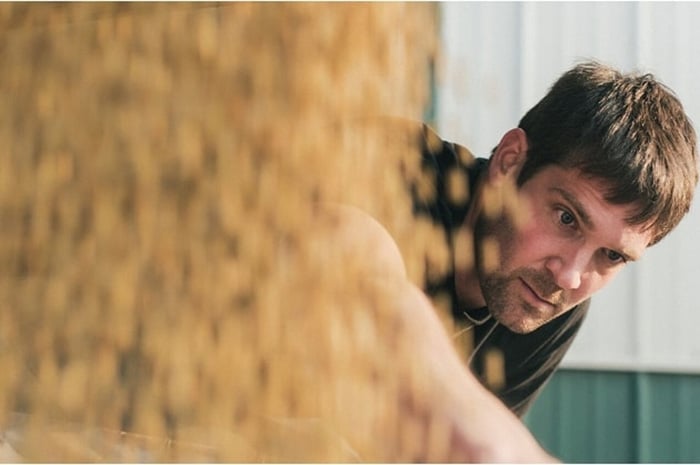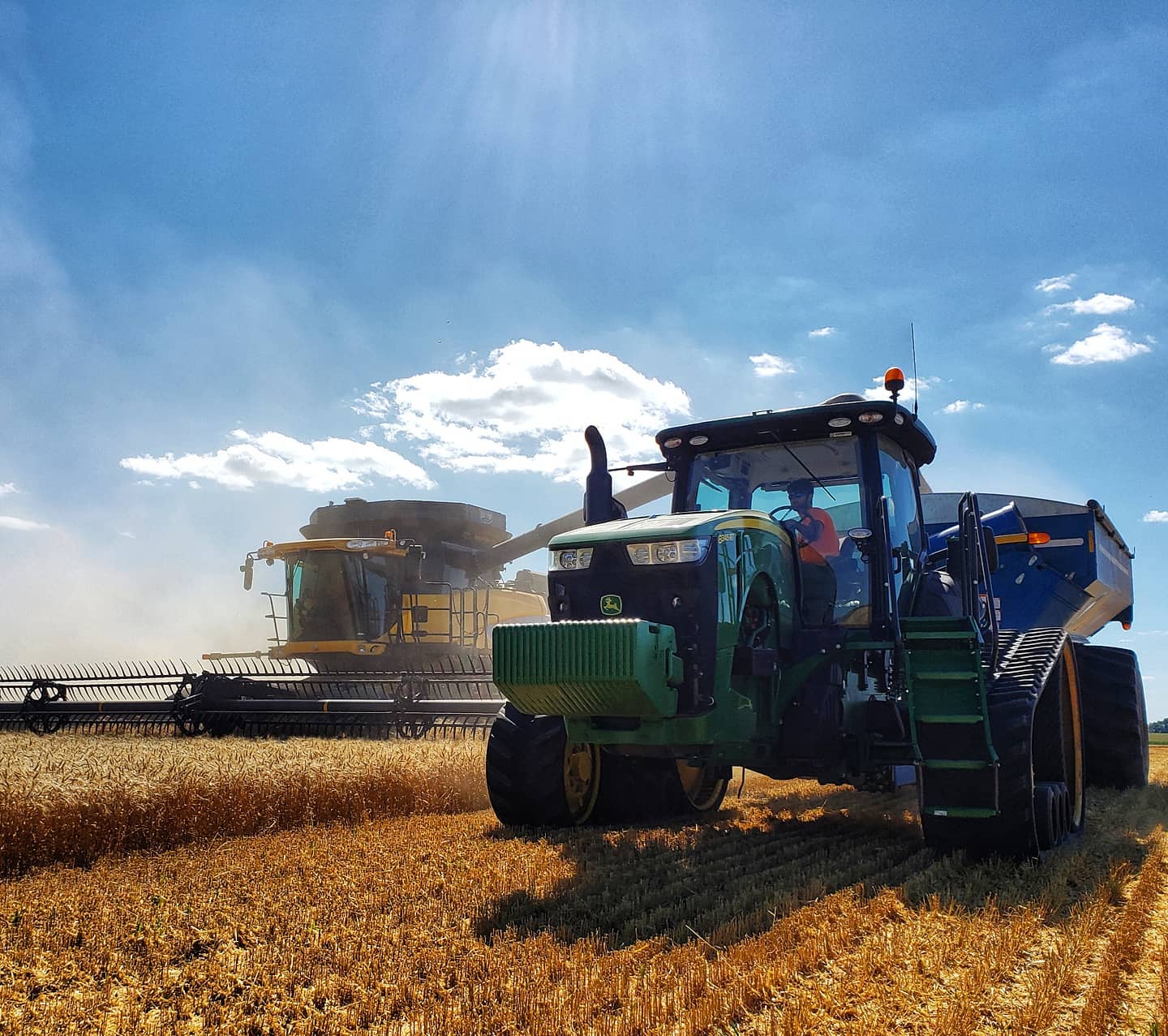Zach Johnson is known to his fans as the MN Millennial Farmer. Like the four generations before him, he’s tending the acreage his Swedish-born ancestors homesteaded back in 1876 near Lowry, Minnesota.
As others in his generation, he's pointed his camera lens onto his life and work, filming videos for his YouTube channel about everything from drain tiling to his trip to the Rose Bowl parade. And on Facebook and Instagram, he posts photos and stories from the farm along with family snapshots, connecting with farmers as well as urbanites all over the world. (For more about his video blog and life out in the open, please see our related blog post.)
Recently, we sat down with Zach to talk a bit about how he got into farming, where the industry is headed, and what it will take for someone like him to succeed in the future.
How millennials fit in to farming
Growing up on the family farm, Zach didn’t necessarily see himself as one day becoming a farmer. In 2003, he graduated from high school and enrolled in the automotive machines program at a trade school in Bemidji. “When I got out into the real world, I decided the farm was the most attractive opportunity for me. I loved it.”
Zach’s father, Nate, still owns much of the land, but they work together. In addition to working the family acreage, Zach grows corn and soybeans on other land, some that he’s purchased and some that he rents.
Zach is something of a rarity these days. In the U.S., the millennial generation (those born between 1981 and 1996) represents the largest population, at 80 million people. Yet, millennials make up 8 percent of all farmers.
Why are so few of his generation taking up farming? Zach could come up with many reasons. For starters, it’s not exactly a glamorous career.
In a start-up scenario, the economics of the traditional corn and soybean operation are extremely tough. With land selling at $6,000 an acre and up, the half a million dollars' worth of machinery needed to work it, not to mention the facilities needed for grain storage, it’s hard to make a living on 160 acres of land.
“You just can’t come from a non-farm family and just dive into it,” he says. “I don’t see how that would work.”
Here's another possible factor: When Zach and his peers grew up on the farm, it was a time when kids were less involved and less essential to the operation. Though Zach helped with harvesting when he learned to drive, he didn’t grow up with the daily chores. When Zach was 7 years old, his father, for example, sold off the cattle and pigs.
Still, he sees other creative ways to enter agriculture. “I think there are some real opportunities in the niche market coming about right now, and I think there will be more opportunity for that in the future. If you came up with a business plan that focused on a niche market, you could start doing that.”
The shifting landscape of Minnesota farming
Even someone as young as Zach has witnessed some large shifts in the economics of farming in his lifetime. He’s watched the number of pork producers dwindle in his county to a consolidated few.
“Dairy is a tough one,” he adds. Back in 2006, shortly after he started farming full time, his county had around 200 dairy farms. A decade later, it was down to 61. The brutal milk market of the past three years is prompting even more producers to exit the market. For example, he knows six dairy farmers, but in the past year, four have left the business.
The squeeze on dairy and pork producers has him thinking about his future as a corn and soybean farmer.
“I hope I’m wrong, but that could be the direction corn and soybeans are going in,” Zach said. “They’ll weed out the producers that can’t keep up for one reason or another. I hope that doesn’t happen, but I think the possibility is there.”
Taking the wheel of the future of agriculture
Like many in the industry, Zach and his family don’t simply live off the original century farm. In addition to farming and making video blogs, he’s starting to take over a farm financial management business.
One of the old beliefs Zach sees as holding some farmers back is, “if you get out there every day and get your hands dirty, you’ll make money.” However, farming is now a much bigger business than it was in past generations, because you need more acreage and more machinery to make a living from it. From what he sees, the financial savvy to manage these bigger operations has not always kept pace with the growth.
“To put it bluntly, I think there’s a lot of ways to waste your time out there because guys are out there working way too hard on things that aren’t making them any money,” Zach says.
Making it in agriculture means managing in the office is just as important as getting outside, he said.
“Keeping accurate records and understanding your cash flow is the foundation to your business,” he says. “That’s something Dad has told me since I was a kid. Realistic and accurate balance sheets and cash flow are super important to understanding where you’ve been and where you are, so you can fix where it’s broken.”
One way to make those balance sheets work is looking for new ways to reduce costs, and for Zach, technology has been a big helper. An internet connection (along with the shed they rebuilt a few years ago) lets him spend the winter catching up on machine repairs and maintenance. With a little research, he can find the part and fix it himself for a fraction of the cost of paying someone to do the work.
“Technology has allowed us to be resourceful, but that’s one way to survive,” he says. “In this market where my corn is not necessarily more valuable than his corn, it’s the lowest-cost producer that wins in the long run.”
Two generations, working together
For now, Zach and his dad, Nate, work together, each bringing their strengths and experiences to the partnership. He praises his dad’s wisdom and marketing skills.
“I think I bring the younger generation philosophy of trying to think outside the box. And he’s there trying to tell me why that outside-the-box thinking didn’t work for him last time he tried it 30 years ago," Zach says. "I think we balance each other out pretty well.”
What stays with Zach is a saying by David Kohl: “If you listen to Grandpa too much, you’re gonna go broke. If you don’t listen to Grandpa enough, you’re gonna go broke."
“I always try and remember that.”
Zach says when Nate started in 1980, there was no money in farming. "Five years later, there was less than zero money in farming." That forced Nate to be resourceful in order to survive.
"I think survivors tend to live their lives differently," Zach says. "Now I have to take that and figure out how to apply that to today."
*The views, comments and opinions expressed in this article are the sole responsibility of the individual and do not reflect the views of Minnwest Bank.
To view more posts from the MN Millennial farmer check out our related blog posts below.


